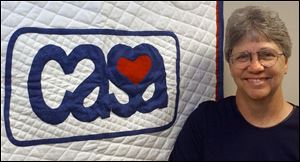
Court volunteer goes the distance for youths caught in custody feuds
7/15/2002
Court advocate Billie Waymer uses a pseudonym to protect her identity and those of family and friends, because of fear of reprisal for a recommendation that upsets a parent.
Billie Waymer, an eight-year Court Appointed Special Advocate volunteer, made no attempt at modesty after she received The Power of One Award at the Sylvania Country Club April 17 for her work helping children and parents during custody battles.
Though she may have been surprised, she, along with her co-workers, knew it was well-deserved.
“I enjoy what I do, but I've gotten fairly good at what I do,” says Mrs. Waymer, who uses a pseudonym for her last name because of the nature of her work.
And what she does is no easy feat. As one of 150 active special advocates in Lucas County, Mrs. Waymer makes some tough recommendations - recommendations that affect children's lives and well-being, as well as parents' rights and custody.
Advocates are specially trained volunteers who are asked to help resolve court cases dealing with everything from neglected or abused children to those placed in the middle of harsh custody battles. It is their job to research each case by interviewing the involved child, obtaining medical and educational records, and observing the family, and then writing a recommendation on how each case should be handled.
While program associate director Anita Levin wants to see more advocates, she said it's not a job to be taken lightly. Interested individuals can't just walk into the office in the Juvenile Justice Center on Spielbusch Avenue. Instead, they have to fill out an in-depth application, complete with background checks and references. They also have to attend 36 hours of training and ongoing seminars.
There are not enough volunteers to take on all the cases, but the office still turns down half the applicants.
Though volunteer work is supposed to be something individuals do in their spare time, Mrs. Waymer's work as an advocate sometimes encompasses long hours.
Most of her cases involve children whose parents are divorcing and cannot agree on custody. Many want nothing to do with the other parent and do not want to give him or her visitation rights. Some involve accusations of neglect or sexual abuse. All affect the children's lives.
“There are lots of times I lie awake at night and stare at the ceiling and think about what I'm going to do with a case, and it's a lot of frustration,” she said. “But I think if, five years from now, I can look back and know that I've made a difference in the life of a child, then it's worth every bit of stress, and torment, and tears.”
But with the high times and low times come dangers as well.
“Parents get ugly when you make decisions about their kids. People are unhappy that you are trying to take their kids away,” she said, adding that many volunteers, including herself, take on a fake or amended name when working on a case. They also keep private information private - the names of their husbands and wives, their careers and work places, phone numbers, identifying information - to protect themselves.
“I've never been physically threatened, but it happens,” she said, adding that she has been verbally assaulted.
Despite all the problems and restless nights, Mrs. Waymer said she intends to keep on volunteering until she's too old to appear in court.
About 90 cases, with 140 children, have been investigated by Mrs. Waymer, who has outlived the average volunteer advocate life span by six years.
“You always can learn something new. I don't ever think you can say you know it all, because as soon as you do, something will surprise you,” Mrs. Waymer said.
She is a model advocate, said Carol Kunkle, the program's director.
“Her focus is on the child. Oftentimes, the parents have lost that focus. All of their energy goes into the fight,” Ms. Kunkle said.
“We need to have someone go in there and try to sort things out so they can present a clear picture to the court. ... She's got such a good reputation that the judges and magistrates are actually asking that she be assigned to cases.”
Mrs. Waymer said she began volunteering after learning about how easy it is for children to “get lost in the system.”
“It's the love of children that gets you into this, and it's the love of children that keeps you in this,” she said.
“When you get into this and you open the paper and see things like that mother[Tarajee Shaheer Maynor] who left her kids in the car ... those are the kinds of things that just make you crazy.”
She said the example that troubles her the most is that of Susan Smith, the mother who drowned her two young boys in 1994 before telling police they had been abducted and pleading for her children'' safe return on national television.
The boys were stuck inside her car when she pushed it into a lake in Union County, S.C.
Those are the cases Mrs. Waymer most wants to prevent.
“The terrible thing about that case was that the father would have taken those children, but she wouldn't let him have them,” Mrs. Waymer said. “She killed them instead.”
There's not a lot of time to focus on individual cases because work at CASA never stops. “I can tell you that I do not ever forget any of them,” she adds. “But you have to move on. There are always six more cases waiting.”